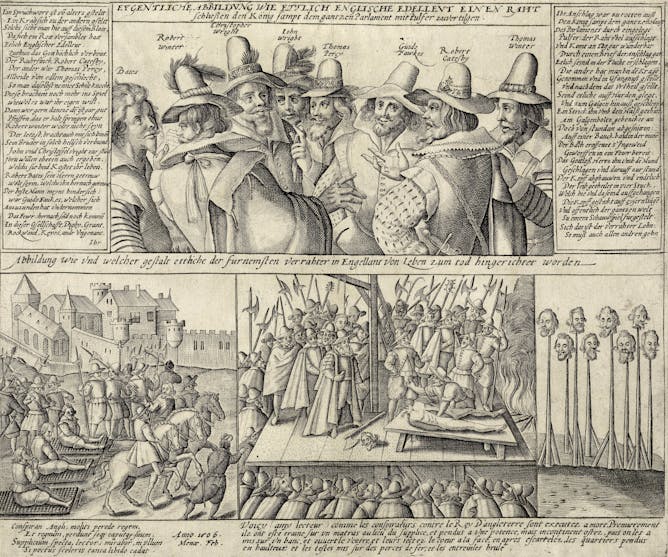|
|
|
Editor's note
|
|
Before coming to the UK from Canada, I had no clue what Bonfire Night was. It was vaguely explained to me by friends as a celebration of some man named Guy Fawkes and his failure to blow up parliament on November 5th, 1605. Traditionally, the occasion is marked with fireworks, bonfires, and the burning of Guy Fawkes effigies. Or, as I’ve found in London, paying a £10 entry fee to stand in a wet, muddy park in some corner of the city, shivering while you wait for a five-minute fireworks display soundtracked by The Pirates of the Caribbean and Star Wars.
Of course, the real history behind Bonfire Night is far more dramatic than my recent celebrations let on. England in 1605 was bitterly divided – except back then, it was a religious schism taking place between the Protestants and the Catholics following the Reformation. Following the foiled attempt by Fawkes and his 12 co-conspirators, it only got worse. Accusations of treason, heresy, and even witchcraft, were used to persecute perceived enemies of the crown. Catholics fled north to escape, settling in places like Lancashire, which was cast as lawless – and full of witchcraft.
Through the lens of Jeanette Winterson’s The Daylight Gate, a fictional account of England in the early 1600s, Shareena Z Hamzah writes about the horrendous treatment of Catholics and women accused of murder by witchcraft. While Bonfire Night is a reminder of Fawkes, it should also be a reminder of the innocent people caught up in England’s troubled past.
And if you’re reading this before breakfast, it might be a good time to do some exercise, according to health experts. Perhaps even better if you have some of the new trainers that have got the
sporting world in a quandary.
|
Jo Adetunji
Deputy Editor
|

|
|
Top stories
|

After the main plotters of the Gundpowder plot were tortured and executed, accusations of treason, heresy, and witchcraft were used to persecute other enemies of the Crown.
Crispijn van de Passe the Elder/ Wikimedia
Shareena Z Hamzah, Swansea University
Bonfire Night keeps the flames of division burning.
|

shutterstock.
Spectral-Design/Shutterstock
Rob Edinburgh, University of Bath
Fasting exercise could help lower your risk of developing type 2 diabetes.
|

Christian Bruna/EPA
Bryce Dyer, Bournemouth University
Can running shoes make the difference that breaks a record? Nike's new trainers are neither the first nor last examples of technology causing a stir in competitive sport.
|
Politics + Society
|
-
Roger Awan-Scully, Cardiff University
Nearly 60 members of parliament have said they won't run again in 2019. It's worth looking closely at who they are and why they are quitting.
-
Graham Bowpitt, Nottingham Trent University
And homelessness makes reoffending more likely.
-
Robert Hesketh, Liverpool John Moores University
Faced with cutbacks to youth services and limited opportunities, risk-taking behaviour can, for some, become highly alluring.
-
Adham Saouli, University of St Andrews
Why the armed group, Hezbollah, doesn't want ongoing protests to upset the ruling coalition in Lebanon.
|
|
Science + Technology
|
-
Michael Scott, UCL
What ancient crop genomes can tell us about our history.
-
Camilla Elphick, The Open University; Graham Hole, University of Sussex; Lucy Welsh, University of Sussex
Initial research found witness pupils got bigger when correctly identifying a criminal.
-
Bill Sullivan, Indiana University
Sweaty feet and certain cheeses have something in common that makes them reek – can you guess what it is?
|
|
Health + Medicine
|
-
Anna Davies, Trinity College Dublin; Agnese Cretella, Trinity College Dublin; Monika Rut, Trinity College Dublin; Stephen Mackenzie, Trinity College Dublin; Vivien Franck, Trinity College Dublin
These inspirational food sharing initiatives around the world demonstrate that sustainable food system can – and should – be democratic.
|
|
Business + Economy
|
-
Louis Brennan, Trinity College Dublin
Although it has yet to fly any paying passengers and is currently loss making, Virgin Galactic aims to be profitable by 2021.
|
|
Environment + Energy
|
-
Ian Boyd, University of St Andrews
Much of the UK's farmland is unproductive. It could be put to better use storing carbon, offering recreation and providing wildlife habitat.
|
|
| |
Featured events
|

|
Chancellors' Building 1.12, University of Bath, Claverton Down, Bath, Bath and North East Somerset, BA2 7AY, United Kingdom of Great Britain and Northern Ireland — University of Bath
|

|
The Bramall, University of Birmingham, Birmingham, Birmingham, B15 2TT, United Kingdom of Great Britain and Northern Ireland — University of Birmingham
|

|
Northampton Square, London, London, City of, EC1V 0HB, United Kingdom of Great Britain and Northern Ireland — City, University of London
|

|
Chancellors' Building 1.11, University of Bath, Claverton Down, Bath, Bath and North East Somerset, BA2 7AY, United Kingdom of Great Britain and Northern Ireland — University of Bath
|
|
|
|
| |
| |
| |
| |
| |
|
|
|
|
|
|
|